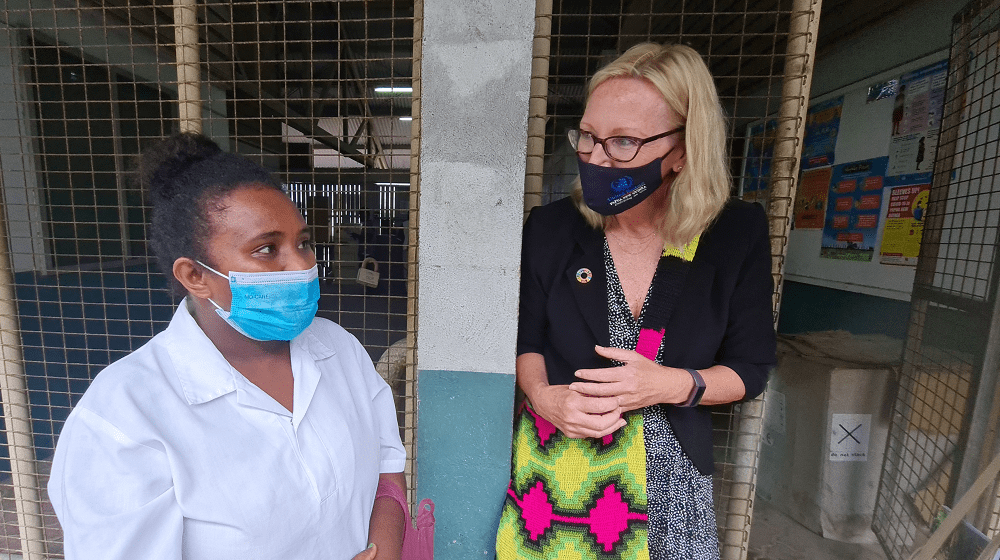Sr. Michelle Kalabia, Family Support Center Caretaker (Left) explaining her concerns during Marielle Sander, the UNFPA Representative’s visit at Buka General Hospital in Buka, the Autonomous Region of Bougainville on 26th May 2021. On the same day, they signed a Letter of Agreement (LoA) for a partnership to implement Zonta International-funded project. The two-year project aims at providing quality essential services including long-term recovery for women and girls who experience violence in Papua New Guinea. Photo: UNFPA/Fitsum Habtemariam
Michelle Kalabai, started providing essential services for women and girls who survived gender based violence (GBV) since the beginning of 2021 at the Family Support Center (FSC) of Buka General Hospital in Buka, the Autonomous Region of Bougainville.
The main services she provides to survivors of GBV is Psychological First Aid (PFA). She also provides safe and comfortable environment for the survivors before proceeding with medical assessments and treatment including counselling.
Since FSC shares the building with Mental Health Clinic in the hospital, the same staff provides both services for FSC and Mental Health Clinic. ‘‘I just came back from study specializing in Mental Health Nursing so I was given the responsibility to provide the services to the GBV survivors in addition to providing mental health services as well.” Michelle said.
Michelle finds her work most fulfilling and says GBV has become a huge concern in the society today. Helping GBV survivors get the basic services that they need to get by, improve their lives and value themselves is what gives meaning to the mission of health care professionals like Michelle.
Sharing a story about how the services at the center helped save the life of a GBV survivor, Michelle recounted the emotional reunion of a women with her two children and the regret the perpetrator felt afterwards. ‘‘She was a survivor of Intimate Partner Violence (IPV) who came to the FSC and was provided with the basic services,’’ she said, and after two weeks, her husband banned her from seeing her children for one month.’’ women facing physical, psychological and justice challenges continue to make the work of centers such as the FSC critical.
Michelle explained, based on her experience, factors that continue to make it difficult for women to get help when they experience violence. “Husband could be the only bread winners in the family and when the men are reported for alleged violence, they threaten the female survivors, or the perpetrator could be someone known to the victim or her relatives. There are also cases where biological fathers or uncles are the perpetrators and the issue is settled at the village level to protect dignity of the family. It also happens that sometimes, the survivor could just let the cases go for fear of shame and discrimination within the family and the community.”
We plan to do more to fill the gap on what needs to be done to gender-based violence, Mitchelle says, but staff shortage and capacity building have been serious challenges. In the short term, she and her team is looking for technical support from partners to make the FSC a ‘one stop-shop’ that provides survivors of violence with psychosocial, paralegal and case management support and medical services. We have our fingers crossed, she said. We hope partners will come through.
Michelle added, things that would enable her to better serve her clients is, a good internal referral pathway within hospital and also with other partners including the police, safe house, and the court.
So far, she has benefited from UNFPA supported trainings that impacted her work and have equipped her with the knowledge and skills to GBV management and improve the outcome for women experiencing violence. Michelle said that, prior to the training, she was missing out on some of the essential services that the survivors needed.


